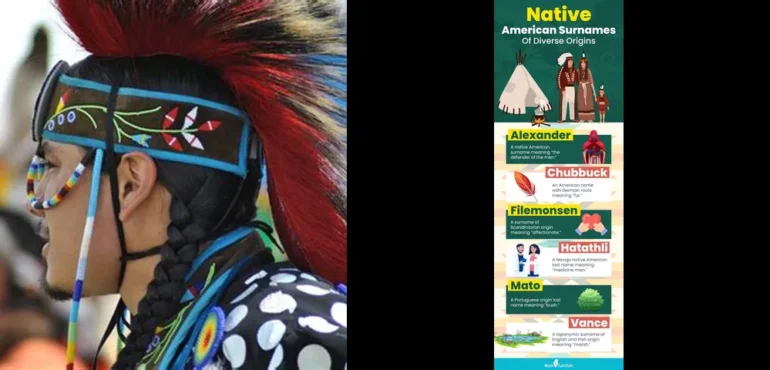Are you curious about the fascinating world of Native American surnames? From the enchanting Pueblo Tribe to the iconic Cherokee Nation, these names carry a rich history and cultural significance. Whether you’re searching for your own ancestral roots or simply intrigued by the diversity of surnames, this blog post will take you on an exhilarating journey. Join us as we delve into the understanding, significance, and commonality of Native American surnames, exploring the intriguing blend of indigenous traditions and European influences. Get ready to uncover the hidden stories behind these captivating names that have stood the test of time.
Understanding Native American Surnames
Delving into the realm of Native American surnames unveils a tapestry of cultural significance and ancestral pride. These surnames serve as more than identifiers; they are the bearers of stories, the keepers of history, and a bridge to the rich traditions of indigenous peoples. With every name spoken, there is a connection to the land, a specific tribe, or a revered practice that has endured through the tumult of history.
Significance of Native American Surnames
The crafting of a surname within Native American communities was not arbitrary but steeped in meaning. The name “Arrow,” for instance, is not just a nod to ancient weaponry, but a testament to the skill and survival of a people who thrived in harmony with nature. Similarly, “Blackrock” speaks volumes about the intimate relationship between a family and the distinctive landscape they call home. These surnames are a silent yet potent declaration of identity and belonging.
Consider the surname “Bravebird”, which might originate from a legendary figure within a tribe known for their courage and freedom of spirit. It is a banner of valor passed down through generations. Other surnames like “Chubbuck” or “Countryman” could reflect personal characteristics or roles within the community that were highly esteemed. “Filemonsen” and “Huaman” could be indicative of a fusion of native and European influences, while “Pompey” might be associated with a significant event or place that shaped the lineage of those who bear the name.
| Last Name | Total | US Rank |
|---|---|---|
| Arrow | [Total] | [US Rank] |
| Blackrock | [Total] | [US Rank] |
| Bravebird | [Total] | [US Rank] |
As we uncover these names, we are reminded that each one is a narrative, etched into the very fabric of Native American culture. The adoption of surnames after personal names was a significant cultural shift that occurred around 1900, reflecting the dynamic history of a people adapting to the ever-changing world. Translations from native tongues to English, French, or Spanish immortalized the indigenous lexicon, ensuring that the essence of Native American heritage continued to resonate despite the forces of colonization and change.
In examining the significance of these names, we are invited to appreciate the depth and diversity of Native American cultures. As we explore further, we will delve into the impact of European influence on these surnames, the distinct surnames of the Pueblo tribe, and the notable last names of the Cherokee. These threads of history and identity are woven into the greater narrative of the Native American experience, each surname a vibrant hue in the broader mosaic of their story.
Common Native American Surnames
Delving into the tapestry of Native American surnames unveils a profound narrative of identity and heritage. Names such as “Bravebird” and “Chubbuck” echo the valor and esteemed roles etched within tribal communities. Surnames like “Countryman,” “Filemonsen,” “Huaman,” and “Pompey” serve as a lexicon of cultural pride, each one recounting the lineage and customs of its bearers.
Interestingly, certain Native American surnames have woven themselves into the broader American nomenclature. Names like “Smith,” “Johnson,” “Begay,” and “Locklear” are shared across diverse ethnic backgrounds, highlighting a historical tapestry of interactions between Native Americans and European settlers. This blend of names stands as a testament to the interconnectedness of cultural histories.
Navajo Last Names
The Navajo people, in particular, hold a treasure trove of distinctive surnames such as “Bitsillie,” “Tsinnajinnie,” “Todachine,” and “Todacheeny.” Names like “Hatahle,” “Hathale,” “Deshcheenie,” and “Tsinajine” often draw from the tribe’s customs, ancestral stories, or the very landscapes they inhabit. Each name encapsulates an element of Navajo life, offering a glimpse into a rich cultural fabric.
European Influence on Native American Surnames
Colonial history has left an indelible mark on Native American nomenclature. The adoption of European surnames by some Native Americans is a reflection of missionary endeavors and the subsequent conversions to Christianity. As a result, Hispanic, French, English, and Scottish last names have found a place in Native American communities, signifying the cultural exchanges of the colonial period. These names, while European in origin, are now interwoven with the unique identities of Native American tribes and their members.
The interplay of names and histories is a fascinating realm, highlighting how the currents of time and society shape the identities we carry. As we continue to explore the diverse surnames across Native American tribes, we uncover the stories of people and places, past and present, that are central to the fabric of North American history.
Pueblo Tribe Surnames
The Pueblo people, renowned for their distinctive cultural heritage and historical depth, possess surnames that are deeply entwined with their identity. Names such as Acoma, Galisteo, Jemez, Laguna, and Picuris are more than mere labels; they signify an intrinsic connection to the land and an enduring legacy of their ancestors. These surnames frequently denote a family’s lineage or a person’s affiliation with pueblos situated beyond their native community, often through the bonds of marriage and kinship. This nomenclature system reflects the Pueblo tribes’ profound ties to specific locations, emphasizing their storied past and the landscapes that are integral to their cultural narratives.
Cherokee Last Names
The Cherokee Nation, with its rich linguistic and social heritage, has preserved its history through evocative last names that are rooted in the Cherokee language. Ahoka, carries the meaning of “the district,” pointing to a geographical or administrative region significant within the tribe. The surname Awiakta translates to “eye of the deer,” indicative of a connection to nature or a particular animal that holds symbolic importance. Catawnee suggests a lineage related to a clan within the diverse Cherokee tribes, highlighting the structured clan system that is pivotal to Cherokee identity. While Chewey remains a mystery in its origins, its very presence speaks to the complex tapestry of names that have been passed down through generations. These surnames not only serve as identifiers but also as cultural beacons that illuminate the Cherokee’s intricate social structures and their profound reverence for their language and history.
As we delve into the world of Native American surnames, we uncover the layers of meaning and history embedded within each name. These surnames are a testament to the resilience and adaptation of Native American cultures in the face of change and a reminder of the vibrant communities that continue to thrive today.
FAQ
Q: Did Native American tribes have last names?
A: By 1900, Native Americans adopted the custom of adding surnames or family names after their personal or first names.
Q: What are some surnames of the Chickasaw tribe?
A: Some of the surnames from the Chickasaw tribe found in the collection are Airington, Colbert (Mead), Laber, Kemp, and Minto-ho-yo (Mead).
Q: Do Native Americans use last names?
A: By 1900, Native Americans adopted the custom of adding surnames or family names after their personal or first names. They also started using names of non-Indian origin and translated names from native languages into English, French, or Spanish.



